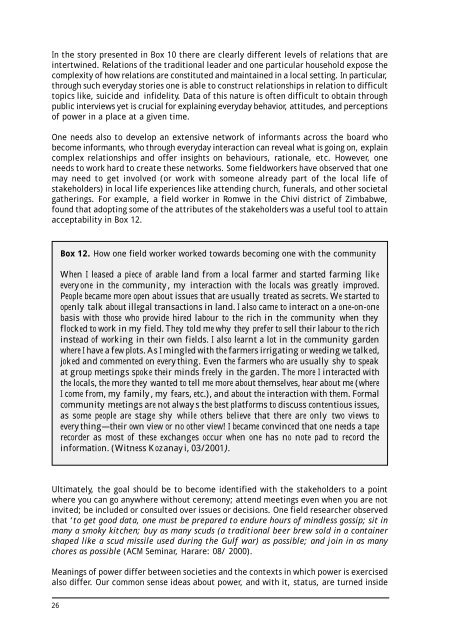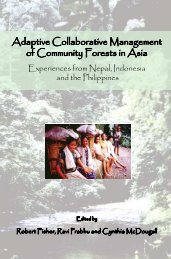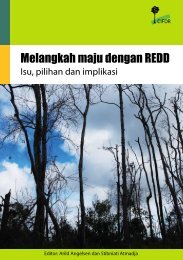Where the power lies: multiple stakeholder politics over natural ...
Where the power lies: multiple stakeholder politics over natural ...
Where the power lies: multiple stakeholder politics over natural ...
Create successful ePaper yourself
Turn your PDF publications into a flip-book with our unique Google optimized e-Paper software.
In <strong>the</strong> story presented in Box 10 <strong>the</strong>re are clearly different levels of relations that are<br />
intertwined. Relations of <strong>the</strong> traditional leader and one particular household expose <strong>the</strong><br />
complexity of how relations are constituted and maintained in a local setting. In particular,<br />
through such everyday stories one is able to construct relationships in relation to difficult<br />
topics like, suicide and infidelity. Data of this nature is often difficult to obtain through<br />
public interviews yet is crucial for explaining everyday behavior, attitudes, and perceptions<br />
of <strong>power</strong> in a place at a given time.<br />
One needs also to develop an extensive network of informants across <strong>the</strong> board who<br />
become informants, who through everyday interaction can reveal what is going on, explain<br />
complex relationships and offer insights on behaviours, rationale, etc. However, one<br />
needs to work hard to create <strong>the</strong>se networks. Some fieldworkers have observed that one<br />
may need to get involved (or work with someone already part of <strong>the</strong> local life of<br />
<strong>stakeholder</strong>s) in local life experiences like attending church, funerals, and o<strong>the</strong>r societal<br />
ga<strong>the</strong>rings. For example, a field worker in Romwe in <strong>the</strong> Chivi district of Zimbabwe,<br />
found that adopting some of <strong>the</strong> attributes of <strong>the</strong> <strong>stakeholder</strong>s was a useful tool to attain<br />
acceptability in Box 12.<br />
26<br />
Box 12. How one field worker worked towards becoming one with <strong>the</strong> community<br />
When I leased a piece of arable land from a local farmer and started farming like<br />
everyone in <strong>the</strong> community, my interaction with <strong>the</strong> locals was greatly improved.<br />
People became more open about issues that are usually treated as secrets. We started to<br />
openly talk about illegal transactions in land. I also came to interact on a one-on-one<br />
basis with those who provide hired labour to <strong>the</strong> rich in <strong>the</strong> community when <strong>the</strong>y<br />
flocked to work in my field. They told me why <strong>the</strong>y prefer to sell <strong>the</strong>ir labour to <strong>the</strong> rich<br />
instead of working in <strong>the</strong>ir own fields. I also learnt a lot in <strong>the</strong> community garden<br />
where I have a few plots. As I mingled with <strong>the</strong> farmers irrigating or weeding we talked,<br />
joked and commented on everything. Even <strong>the</strong> farmers who are usually shy to speak<br />
at group meetings spoke <strong>the</strong>ir minds freely in <strong>the</strong> garden. The more I interacted with<br />
<strong>the</strong> locals, <strong>the</strong> more <strong>the</strong>y wanted to tell me more about <strong>the</strong>mselves, hear about me (where<br />
I come from, my family, my fears, etc.), and about <strong>the</strong> interaction with <strong>the</strong>m. Formal<br />
community meetings are not always <strong>the</strong> best platforms to discuss contentious issues,<br />
as some people are stage shy while o<strong>the</strong>rs believe that <strong>the</strong>re are only two views to<br />
everything—<strong>the</strong>ir own view or no o<strong>the</strong>r view! I became convinced that one needs a tape<br />
recorder as most of <strong>the</strong>se exchanges occur when one has no note pad to record <strong>the</strong><br />
information. (Witness Kozanayi, 03/2001).<br />
Ultimately, <strong>the</strong> goal should be to become identified with <strong>the</strong> <strong>stakeholder</strong>s to a point<br />
where you can go anywhere without ceremony; attend meetings even when you are not<br />
invited; be included or consulted <strong>over</strong> issues or decisions. One field researcher observed<br />
that ‘to get good data, one must be prepared to endure hours of mindless gossip; sit in<br />
many a smoky kitchen; buy as many scuds (a traditional beer brew sold in a container<br />
shaped like a scud missile used during <strong>the</strong> Gulf war) as possible; and join in as many<br />
chores as possible (ACM Seminar, Harare: 08/ 2000).<br />
Meanings of <strong>power</strong> differ between societies and <strong>the</strong> contexts in which <strong>power</strong> is exercised<br />
also differ. Our common sense ideas about <strong>power</strong>, and with it, status, are turned inside

















